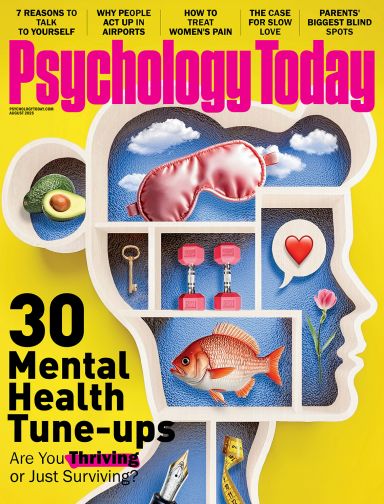Psychosis
Psilocybin, Teens, and ADHD: A Prescription for Psychosis
While magic mushrooms aren't considered addictive, some trips don't end.
Posted March 27, 2025 Reviewed by Gary Drevitch
Key points
- Magic mushrooms hold medical potential, but there are risks that aren't often discussed.
- Cannabis, mushrooms, and ADHD stimulants—all correlated to psychosis—isn't an unusual cocktail for youth.
- If there's a family history of psychosis, parents/providers should be extra vigilant for the above equation.
Psilocybin has a colorful history (pun intended). The active ingredient in “magic mushrooms,” psilocybin etymologically translates to “bare headed” or “stripped bare” (Etymonline, 2025) referencing the fact that the pellicle, or slimy film, of the fungus, is easily slipped off the Smurfy proliferates.
Long before the more scientific term, however, the Aztecs, who used it for ceremonial purposes, called it teonanacatl (Nichols, 2020) translating to “god’s flesh,” so magical were the properties considered to be.
Modern trends in psilocybin
Like many things once appreciated in moderation, magic mushrooms were popularized in the 1960’s and gained a reputation as a drug of abuse. Today, when we add social media to the equation, the interest level grows exponentially, especially with science suggesting ideas about its medicinal use. Indeed, there have been some promising results for the treatment of depression, anxiety, and alcohol abuse (e.g., National Institute of Health, 2024).
Armed with such favorable study results, and research suggesting psilocybin is not particularly addictive, states like Massachusetts have put it to the voters on whether or not to make psilocybin legal; it was voted down there in November, but as recently as February 2025, State Rep. Steven Owens continued to push for its adoption (Creato, 2025).
It has indeed been documented by some researchers (e.g. Woodburn et al., 2024) that psilocybin, when carefully-monitored dosing occurs, has been shown to extinguish the fear response in traumatized or phobic people, and engenders a neuroplasticity that encourages retention of the reduced tendency to be fearful.
Despite this, researchers like Michael Hasselmo of Boston University’s Center for Systems Neuroscience have cautioned that, while psilocybin may well hold some promise in monitored treatment, there are risks—whether carefully dosed or used recreationally—for the potential to accelerate psychosis development in those with genetic loading (e.g., Barron, 2023; Creato, 2025). Hasselmo has encouraged more research on safe practice before bills get passed for further medicinal or recreational use.
So, here we are with a social-media obsessed young generation, many at the age of naturally increased stimulation-seeking, being exposed to trip-encouraging videos, and inundated with information on why and how they should, too. Add to this the chatter about its medicinal effectiveness, and it isn’t hard to see how said generation may be prone to feeling that psilocybin is safe, and thus OK to generally consume; there are echoes similar to the way prescription opiates were looked at as safe to experiment with because they’re prescribed by doctors.
While seemingly never the substance of choice for the court-involved kids I evaluate, I’ve indeed noticed an uptick in the number of juvenile court clientele who have experimented with mushrooms. Researchers have confirmed that age of first use of psychedelics is undeniably trending younger (e.g. Izmi et al., 2024). In fact, Farah et al. (2024) noted that, in 2022, compared to 2018, calls to poison control centers for adolescents who ingested mushrooms more than tripled.
Teens, psilocybin, and psychosis risk
A teen I recently evaluated, whose preference was for marijuana, had also dabbled with mushrooms. They admitted to a nebulous pattern of dissociative symptoms like derealization, along with occasional fleeting hallucinatory activity regardless of if they were actively imbibing in either. Clearly, there were negative residual effects.
Now, it is no secret that marijuana use—these days partaken more liberally given a relaxed societal attitude, and availability in more potent strains than in the past—has been associated with negative long-term effects including dissociation and psychosis. In fact, the Journal of the American Medical Association (JAMA) recently published an article by Myran et al. (2025) revealing that incidents of cannabis use associated with schizophrenia development jumped from 3.7% pre-widespread legalization to 10.3%.
Returning to psilocybin, when medically monitored and carefully dosed, according to Yerubandi et al. (2024), the most common side effects of therapeutic doses were post-psilocybin experience nausea, headache and hypertension. That said, it was documented in this 2019 article by Johnson et al.:
Potential harms include dangerous behavior in unprepared, unsupervised users, and exacerbation of mental illness in those with or predisposed to psychotic disorders. However, scope of use and associated harms are low compared to prototypical abused drugs, and the medical model addresses these concerns with dose control, patient screening, preparation, and follow-up, and session supervision in a medical facility.
Therefore, we should be concerned, given the widespread use of marijuana in youth (e.g., Oregon Health & Science University, 2022), coupled with the exceptional increase in rates of psychotic illness in marijuana users, and the knowledge that psilocybin use, not unheard of among teen marijuana users, can also encourage psychotic illness, that using the two together could aggressively accelerate psychosis development, especially if there is a family history of psychotic illness.
Now, add to this that marijuana is favored for ADHD self-medicating (e.g. Olivardia, 2025), and that individuals with ADHD present a population whose members may also be prescribed a stimulant. High doses of stimulant medications have been associated with the development of psychosis, particularly if amphetamine-based like Adderall (e.g. McLean Hospital, 2024). This equation of substance abuse, neurodevelopmental complications, genetics, and prescriptions, while the exception, would generate a volatile perfect storm that could be avoided.
With this in mind, and the trend in mushroom experimentation seemingly on the rise, asking the juveniles in front of us specifically about psilocybin experimentation, particularly if a kid has mental illness concerns, could not only be a step toward curbing substance use, but also toward reducing onset of severe mental illness. Given the debilitating nature of psychotic illness, correcting the course of even a few is priceless.
If parents or providers witness the above "equation," they might wish to consider conferring with the child's prescriber, engaging the child in substance abuse-focused treatment, and learning about the signs of early psychosis development for early intervention, if required. Early psychosis/first episode programs can found through resources such as Early Psychosis Intervention Network.
Disclaimer: The material provided in this post is for informational purposes only and is not intended to diagnose, treat, or prevent any illness in readers or people they know. The information should not replace personalized care or intervention from an individual’s provider or formal supervision if you’re a practitioner or student.
To find a therapist, visit the Psychology Today Therapy Directory.
References
Barron, M. (2023, February 10). Psilocybin and mental health: The magic in the mushrooms. American Society for Microbiology Articles. https://asm.org/articles/2023/february/psilocybin-and-mental-health-the…
Creato, S. (2025, Februay 19,). Massachusetts lawmakers push bills decriminalizing psilocybin despite negative referendum vote. The Daily Free Press. https://dailyfreepress.com/2025/02/19/massachusetts-lawmakers-push-bill…
Etymonline (n.d.). Psilocybin. Retrieved March 26, 2025. https://www.etymonline.com/word/psilocybin
Farah, R., Kerns, A.F., Murray, A.C., & Holstege, C.P. (2024). Psilocybin exposures reported to U.S. poison centers: National trends over a decade. Journal of Adolescent Health, 74(5), 1053-1056. https://doi.org/10.1016/j.jadohealth.2024.01.027
Izmi, N., Carhart-Harris, R.L. & Kettner, H. (2024). Psychological effects of psychedelics in adolescents. Frontiers in Child and Adolescent Psychiatry, 3:1364617. doi: 10.3389/frcha.2024.1364617
Johnson, M.W., Griffiths, R.R., Hendricks, P.S., & Henningfield, J.E. (2018). The abuse potential of medical psilocybin according to the 8 factors of the Controlled Substances Act. Neuropharmacology, 142, 143-166. doi: 10.1016/j.neuropharm.2018.05.012
Mclean Hospital (2024, September 12). High doses of some prescription stimulants tied to increased psychosis risk. McLean Hospital News. https://www.mcleanhospital.org/news/high-doses-some-prescription-stimul…
Myran, D.T., Pugliese, M., Harrison, L.D., et al. (2025). Changes in incident schizophrenia diagnoses associated with cannabis use disorder after cannabis legalization. JAMA Network Open, 8(2). doi:10.1001/jamanetworkopen.2024.57868
National Institute of Health (2024, January). Psilocybin (Magic Mushrooms). https://nida.nih.gov/research-topics/psilocybin-magic-mushrooms#is-psil…
National Institutes of Health (2024, May). Psilocybin for mental health and addiction: What you need to know. https://www.nccih.nih.gov/health/psilocybin-for-mental-health-and-addic….
Nichols, DE. (2020). Psilocybin: From ancient magic to modern medicine. Journal of Antibiotics, 73(10), 679-686. doi: 10.1038/s41429-020-0311-8.
Olivardia, R. (2025, March 18). The damaging effects of cannabis on the ADHD brain. ADDitude. https://www.additudemag.com/cannabis-use-disorder-marijuana-adhd/#:~:te….
Rideout, N. (2022, December 7). Teen cannabis abuse has increased 245% over 20 years, study finds. Oregon Health and Science News. https://news.ohsu.edu/2022/12/07/teen-cannabis-abuse-has-increased-245-…
Woodburn, S.C., Levitt, C.M., Koester, A.M., & Kwan, A.C. (2024). Psilocybin facilitates fear extinction: Importance of dose, context, and serotonin receptors. ACS Chemical Neuroscience, 15(16), 3034-3043. doi: 10.1021/acschemneuro.4c00279.
Yerubandi, A., Thomas, J.E., Bhuiya, N.M.M.A., Harrington, C., Villa Zapata, L., & Caballero, J. (2024). Acute adverse effects of therapeutic doses of psilocybin: A systematic review and meta-analysis. JAMA Network Open, 7(4). doi:10.1001/jamanetworkopen.2024.5960







